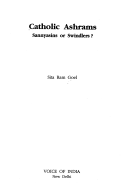Freedom of expression - Secular Theocracy Versus Liberal Democracy (1998)
Works
The Story of Islamic Imperialism in India
Sita Ram GoelThe Calcutta Quran Petition
Sita Ram Goel
Catholic Ashrams
Sita Ram GoelFamous Sita Ram Goel Quotes
Muslim Separatism – Causes and Consequences (1987)
Defence of Hindu Society (1983)
The Story of Islamic Imperialism in India (1994)
How I became a Hindu (1982)
History of Hindu-Christian Encounters (1996)
Sita Ram Goel Quotes about time
Hindu Temples – What Happened to Them, Volume II (1993)
Jesus Christ, Artifice for Aggression, 1994
The Calcutta Quran Petition (1986)
Muslim Separatism – Causes and Consequences (1987)
History of Hindu-Christian Encounters (1996)
History of Hindu-Christian Encounters (1996)
Sita Ram Goel Quotes about religion
Perversion of India's Political Parlance (1984)
“All religions were equal. But Islam was more equal.”
Freedom of expression - Secular Theocracy Versus Liberal Democracy (1998)
Context: The Emergency which Islam had imposed after its advent in India and which had caused resentment among Hindus for a long time, now stood fully sanctioned by the Hindu elite. All religions were equal. But Islam was more equal.
So also in ancient Greece, in ancient Rome, in the whole ancient world, all over Asia and Europe.
The Emerging National Vision, 4 December 1983, Calcutta.
Defence of Hindu Society (1983)
History of Heroic Hindu Resistance to Early Muslim Invaders (1984; 2001)
The Calcutta Quran Petition (1986)
Sita Ram Goel: Trending quotes
St. Francis Xavier: The man and his mission. 1985.
Defence of Hindu Society (1983)
Muslim Separatism – Causes and Consequences (1987)
Sita Ram Goel Quotes
Vindicated by Time: The Niyogi Committee Report (1998)
The Calcutta Quran Petition (1986)
Islam vis-a-vis Hindu temples. (1993)
Freedom of expression - Secular Theocracy Versus Liberal Democracy (1998)
Context: So we are left with Mahatma Gandhi as the first and real prophet of sarva-dharma-samabhâva. (...) The explanations for [Gandhi's] pervert behaviour can be many... Whatever the explanation, the fact remains that he bound the Hindus hands and feet with the shackles of his sarva-dharma-samabhâva, and made them helpless in the face of Islamic gangsterism. At the same time, [Gandhi] gave full freedom to Muslims to deal with Hindus as they pleased. The record of what Muslim did under the leadership of the mullahs and the Muslim League exists in cold print. It never occurred to him to appeal to Muslims even once to practise sarva-dharma-samabhâva vis-à-vis Hinduism. That he thought was against their religion with which he could not interfere. The dope was meant only for Hindus. (...) The temptation to become the spokesman of all religions was irresistible for him, as for many Hindu gurus before and after. He ended by being the spokesmen of none, and made a mess of whatever religion he touched. He never evolved a criterion for distinguishing dharma from adharma.
Vindicated by Time: The Niyogi Committee Report (1998)
Hindu Temples – What Happened to Them, Volume II (1993)
Hindu Society under Siege (1981, revised 1992)
The Story of Islamic Imperialism in India (1994)
How I became a Hindu (1982)
Variant: To me, Dharma had always been a matter of moral norms, external rules and regulations, do's and don'ts, enforced on life by an act of will. Now I was made to see Dharma as a multi dimensional movement of man's inner law of being, his psychic evolution, his spiritual growth, and his spontaneous building of an outer life for himself and the community in which he lived.
The Calcutta Quran Petition (1986)
History of Hindu-Christian Encounters (1996)
Hindu Temples – What Happened to Them, Volume I (1990)
Hindu Temples – What Happened to Them, Volume II (1993)
Vindicated by Time: The Niyogi Committee Report (1998)
History of Hindu-Christian Encounters (1996)
How I became a Hindu (1982)
How I became a Hindu (1982)
Hindu Temples – What Happened to Them, Volume II (1993)
The girl was in tears.
Interview, The Observer. Date : February 22, 1997. http://sathyavaadi.tripod.com/truthisgod/Articles/goel.htm https://egregores.blogspot.com/2009/10/buddha-sri-aurobindo-and-plato.html https://egregores.wordpress.com/2009/11/16/hindus-and-pagans-a-return-to-the-time-of-the-gods/
Genesis and Growth of Nehruism (1993)
Muslim Separatism – Causes and Consequences (1987)
Defence of Hindu Society (1983)
Defence of Hindu Society (1983)
The Calcutta Quran Petition (1986)
Such statements from sufis can be multiplied. Amir Khusru, the dearest disciple of Nizamuddin Awliya (Chishtiyya luminary of Delhi), mourned loudly that if the Hanafi law (which accommodated Hindus as zimmîs) had not come in the way, the very name Hindu would not have survived.
Defence of Hindu Society (1983)
History of Hindu-Christian Encounters (1996)
“…except for the NCERT experts who specialise in making molehills of mountains, and vice versa.”
The Story of Islamic Imperialism in India (1994)
Muslim Separatism – Causes and Consequences (1987)
Genesis and Growth of Nehruism (1993)
How I became a Hindu (1982)
The Calcutta Quran Petition (1986)
Defence of Hindu Society (1983)
The Story of Islamic Imperialism in India (1994)
The Story of Islamic Imperialism in India (1994)
The Story of Islamic Imperialism in India (1994)
The Story of Islamic Imperialism in India (1994)
He chose to be buried “in the vicinity of the temple” which he had replaced with his khãnqãh.
Hindu Temples – What Happened to Them, Volume I (1990)
The Story of Islamic Imperialism in India (1994)
History of Hindu-Christian Encounters (1996)
Hindu Society under Siege (1981, revised 1992)
Muslim Separatism – Causes and Consequences (1987)
Muslim Separatism – Causes and Consequences (1987)
“Fundamentalism is as foreign to Hinduism as honesty is to Christian missions.”
Catholic Ashrams (1994)
Muslim Separatism – Causes and Consequences (1987)
History of Hindu-Christian Encounters (1996)
History of Hindu-Christian Encounters (1996)
The Story of Islamic Imperialism in India (1994)